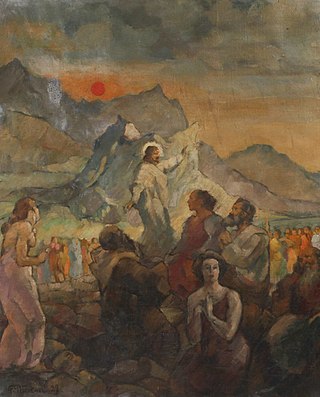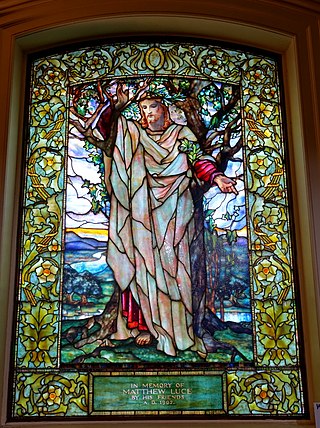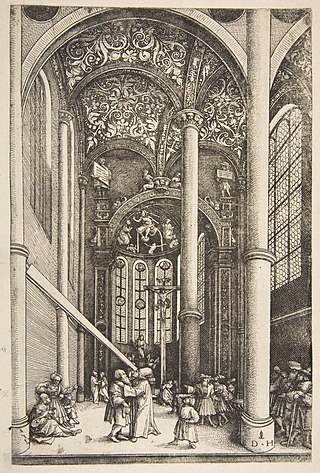
Matthew 3:14 is the fourteenth verse of the third chapter of the Gospel of Matthew in the New Testament. Jesus has come to John the Baptist to be baptized, but in this verse John balks at doing so.

Matthew 4:6 is the sixth verse of the fourth chapter of the Gospel of Matthew in the New Testament. Jesus has just rebuffed "the tempter's" first temptation; in this verse, the devil presents Jesus with a second temptation while they are standing on the pinnacle of the temple in the "holy city" (Jerusalem).

Matthew 4:7 is the seventh verse of the fourth chapter of the Gospel of Matthew in the New Testament. Satan has transported Jesus to the pinnacle of the Temple of Jerusalem and told Jesus that he should throw himself down, as God in Psalm 91 promised that no harm would befall him. In this verse, Jesus quotes scripture to rebuff the devil.

Matthew 6:9 is the ninth verse of the sixth chapter of the Gospel of Matthew in the New Testament and is part of the Sermon on the Mount. This verse is the opening of the Lord's Prayer, one of the best known parts of the entire New Testament.

Matthew 6:10 is the tenth verse of the sixth chapter of the Gospel of Matthew in the New Testament and is part of the Sermon on the Mount. This verse is the second one of the Lord's Prayer, one of the best known parts of the entire New Testament. This verse contains the second and third petitions to God.

Matthew 5:12 is the twelfth verse of the fifth chapter of the Gospel of Matthew in the New Testament. It is the tenth verse of the Sermon on the Mount. This verse is generally seen as part of an expansion of the eight Beatitude, others see it as the second half of the ninth Beatitude, a small group feel it is the tenth Beatitude and thus brings to a close a second Decalogue.

Matthew 5:20 is the twentieth verse of the fifth chapter of the Gospel of Matthew in the New Testament and is part of the Sermon on the Mount. Jesus has reported that he came not to destroy the law, but fulfill it. But in this verse, he makes clear that the common understanding of the Law is not enough.

Matthew 5:23 and Matthew 5:24 are a pair of closely related verses in the fifth chapter of the Gospel of Matthew in the New Testament. They are part of the Sermon on the Mount. Jesus has just announced that anger leads to murder, and anger is just as bad as murder itself. And that whosoever is angry with his brother shall be in danger of the judgment himself. This verse states that resolving these disputes should take priority over religious rituals.

Matthew 5:27 and Matthew 5:28 are the twenty-seventh and twenty-eighth verses of the fifth chapter of the Gospel of Matthew in the New Testament and is part of the Sermon on the Mount. These verses begin the second antithesis: while since Matthew 5:21 the discussion has been on the commandment: "You shall not murder", it now moves to the commandment: "You shall not commit adultery".

Matthew 5:29 is the twenty-ninth verse of the fifth chapter of the Gospel of Matthew in the New Testament and is part of the Sermon on the Mount. It is the third verse of the discussion of adultery.

Matthew 5:35 and Matthew 5:36 are the thirty-fifth and thirty-sixth verses of the fifth chapter of the Gospel of Matthew in the New Testament. They are part of the Sermon on the Mount. These verses are part of either the third or fourth antithesis, the discussion of oaths. Jesus tells his listeners in Matthew 5:34 "to not swear oaths" and in here presents examples of swearing oaths. In context, this passage refers not to the modern understanding of cursing or using foul language, but rather, the act of swearing oaths and making promises.

Matthew 6:3 is the third verse of the sixth chapter of the Gospel of Matthew in the New Testament and is part of the Sermon on the Mount. This verse continues the discussion of how one should give to charity.

Matthew 6:17 is the seventeenth verse of the sixth chapter of the Gospel of Matthew in the New Testament and is part of the Sermon on the Mount. This verse continues the discussion of fasting.

Matthew 6:18 is the eighteenth verse of the sixth chapter of the Gospel of Matthew in the New Testament and is part of the Sermon on the Mount. This verse concludes the discussion of fasting.

Matthew 6:19 and 6:20 are the nineteenth and twentieth verses of the sixth chapter of the Gospel of Matthew in the New Testament and are part of the Sermon on the Mount. These verses open the discussion of wealth. These verses are paralleled in Luke 12:33.

Matthew 6:22 is the twenty-second verse of the sixth chapter of the Gospel of Matthew in the New Testament, and is part of the Sermon on the Mount.

Matthew 6:23 is the twenty-third verse of the sixth chapter of the Gospel of Matthew in the New Testament and is part of the Sermon on the Mount.

Matthew 7:5 is the fifth verse of the seventh chapter of the Gospel of Matthew in the New Testament and is part of the Sermon on the Mount. This verse continues the discussion of judgmentalism.

Matthew 12:13 is the thirteenth verse in the twelfth chapter of the Gospel of Matthew in the New Testament.

Matthew 6 is the sixth chapter of the Gospel of Matthew in the New Testament. This chapter contains the central portion of the Sermon on the Mount, including the Lord's Prayer.





















